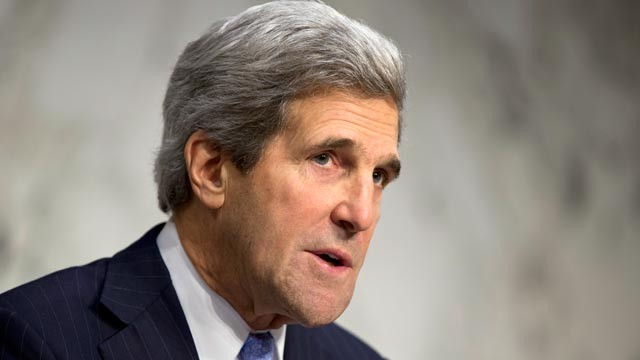

When he succeeded Hillary Clinton as secretary of state in February, Clinton’s emotional departure from the State Department received blanket media coverage. Kerry’s arrival received next to none.
“So here’s the big question before the country and the world and the State Department after the last eight years,” Kerry said in a speech to State Department employees on his first day on the job. “Can a man actually run the State Department? I don’t know.”
As the crowd roared with laughter, Kerry pushed the joke too far.
“As the saying goes,” he said, “I have big heels to fill.”
Nearly three weeks later, Kerry’s first foreign-policy speech as secretary, an hour-long defense of diplomacy and foreign aid, was a flop. The Washington Post gave it 500 words. The New York Times ignored it. (He was also accused of accidentally inventing a new country called “Kyrzakhstan,” an apparent conflation of Kazakhstan and Kyrgyzstan.)
Kerry hadn’t even been Obamas' first choice for the position, getting nominated only when the candidacy of Susan Rice was derailed by her tenuous association with the Benghazi-consulate tragedy in 2012.
The secretary of states' diplomatic adventuring has sometimes whitened knuckles and furrowed brows in the White House, and produced guffaws inside the Beltway. Kerry has a bad habit of wandering off script.
On a trip to Pakistan in August, he created two diplomatic incidents in a single interview. First he said that the Egyptian army was “restoring democracy” when it toppled the countrys' democratically elected president. Then he said that Obama had “a timeline” for ending U.S. drone strikes in Pakistan.
Neither of these declarations aligned with the White House position; within hours, officials in Washington were scrambling to correct Kerrys' statements.
In September, while trying to make the case to Congress for air strikes on Syria, he said during sometimes rambling testimony that the administration might deploy American “boots on the ground”—a statement he had to spend the next several hours trying to roll back.
At a press conference in London a week later, he overshot in the opposite direction, promising that any American strike against Syria would be “unbelievably small”—a bit of impressively self-defeating rhetoric that undermined days of administration efforts to argue that a few dozen Tomahawk cruise-missile strikes would be more than what hawkish critics were calling a pointless “pinprick.”
A word that comes up frequently in conversations about Kerry is gasbag. He had few close friends in the Senate, where he served for nearly 30 years.
“Even as a junior or senior, he was a pompous blowhard,” says someone who attended Yale with Kerry in the 1960s and asked not to be named.
He is a perennial flip-flopper: he fought in the Vietnam War and then protested against it; he supported the 2003 invasion of Iraq and then opposed it; he tried to negotiate with Bashar al‑Assad in 2009, then compared him to Adolf Hitler—and then reopened the door to negotiating with him again.
http://www.theatlantic.com/magazine/archive/2013/12/john-kerry-will-not-be-denied/354688/?google_editors_picks=true

